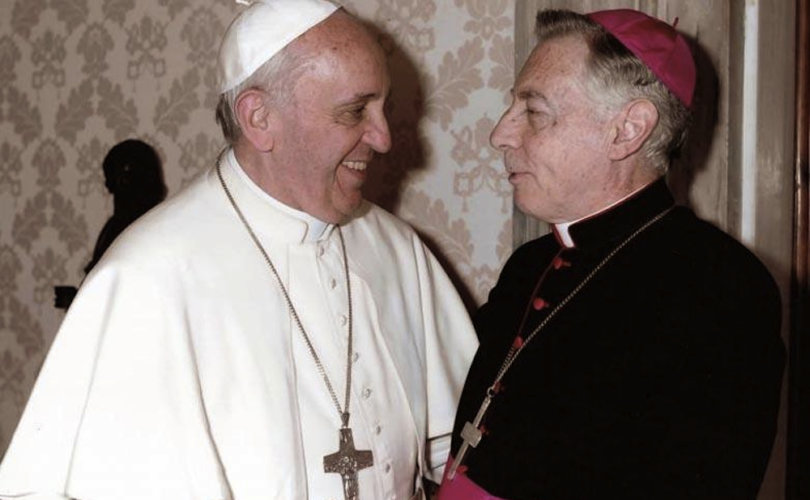
(LifeSiteNews) — I recently read in La Prensa a stunning piece of information about the extent of poverty in Argentine society. The headline reads: “Crude panorama: one million children go to bed on an empty stomach.” The newspaper includes figures from an international report which states that 10 million children in our country “eat less meat and dairy due to a lack of money.”
The liberal-libertarian government boasts of a macroeconomic achievement: having reached fiscal equilibrium and reduced inflation. But it does not notice the cost of the systematic erosion of the middle classes, which are subjected to a growing rate of poverty. This explains why 55 percent of the Argentine population is poor and 11 percent have fallen into indigence. At a glance, one observes unusual scenes – that is, those never recorded in better times – such as people rummaging through piles of garbage in the hope of finding scraps of food.
It is no mystery. These are the real conditions of the microeconomy: prices are constantly rising, and the seller has no choice but to mark up prices. He depends on the wholesaler, the wholesaler depends on the manufacturer, and the manufacturer depends on the conditions that, reasonably or unreasonably, mark the development of the economy, which is a political problem at the national and international level. For its part, capitalism imposes a regime of indebtedness determined by the value of money, an implacable god.
The situation includes a religious problem. The majority of the population is likely still baptized in the Catholic Church. One of Argentina’s age-old problems is the absence of the Eucharist: Argentines do not go to Mass. This can be explained, among other things, by a chronic shortage of priests. The Argentine bishops have made judgments on the current national situation – including, in a subtle way, a critical view of the current political order – especially in plenary assemblies. Such judgments attract the attention of journalists for two or three days. In my opinion, however, they have no real influence on the situation in the country.
Moreover, the bishops profess a kind of “centrist extremism”: they detest what they consider “right-wing” and smile at the “left-wing.” This is also their behavior toward the clergy. It has been this way since the sad ’70s, and that is why they allowed the Movement of Priests for the Third World (which is what they were called). Normal priests who worked as priests did not fail to notice and suffer from it. I have recently read comments that speak of the “hypocrisy of the Argentine Church.” They should rather say “the hypocrisy of the bishops,” not of the whole ecclesial community. This confusion is common among journalists.
A new circumstance now stands out in Pope Francis’ relationship not with Argentina, which he has so far not deigned to visit, but with Peronism and its variants. The Pontiff is implicitly recognized as the leader of Peronism. One recent event demonstrates this: the governor of La Rioja, who aspires to succeed Alberto Fernandez as president of the Justicialist Party after Fernandez was forced to resign over a scandal in his private life, went to meet with Francis. It does not take a genius to recognize that he went to raise the issue of the party presidency. The Peronism of the Pope manifests itself in his populist bent and disregard for Tradition. It is true that this tendency alone does not explain the Pope’s position on the major problems of the Church he must face; his status as a Jesuit weighs on the history of that theological and spiritual tradition.
A recent news item notes that on September 16 the Supreme Pontiff will receive the leadership of the General Confederation of Labor – the legendary CGT – which has been under Peronist control in one way or another for years. As in the case of the meeting with the governor of La Rioja, the CGT will present its criticism of Javier Milei’s government to Jorge Bergoglio, whom they consider the most important Peronist leader. Obviously the CGT will bring to Rome its complaints against the economic orientation of Milei’s government, which it – rightly – considers to be one of the main causes of poverty in Argentine society.
Returning to the issue of poverty that affects more than half the population, we must recognize the gravity of the gradual disappearance of the middle classes, whose existence distinguished Argentina within Latin America. Today we are witnessing a phenomenon that is the opposite of what made our country original: Argentines are emigrating, not only to Bolivia or Peru, but also to Spain and other European countries.
In the Argentine tradition of the 19th century, the Alberdian principle of “to govern is to populate” carried a lot of weight in the shaping of national identity. It referred to the immigration not of “blondes with blue eyes,” but of southern Italians and Spaniards. At the time, the principle attained an extraordinary importance, determining the population of the country and the institution of the middle classes. Symbolically, two literary works and their mutual opposites illustrated the subsequent development of the relationship between the city and the country, the rootedness in the Hispanic-Creole tradition, or the implicit openness to, and the perpetual influence of, the United Kingdom.
In the 20th century there was a liberal vision of Argentina that obtained a replica in the salient phenomenon of Peronism, which began in 1945 on the legendary 17th of October. Peronism had and still has the purpose of changing, of metamorphosing an invariable essence. It has been said that this reality is a feeling. If Peronism truly is a feeling, it can be explained that it now reigns in Rome.
+ Héctor Aguer
Archbishop Emeritus of La Plata
Buenos Aires, Friday, August 30, 2024
Feast of St. Rose of Lima, Virgin, Patroness of the Americas and the Philippines

